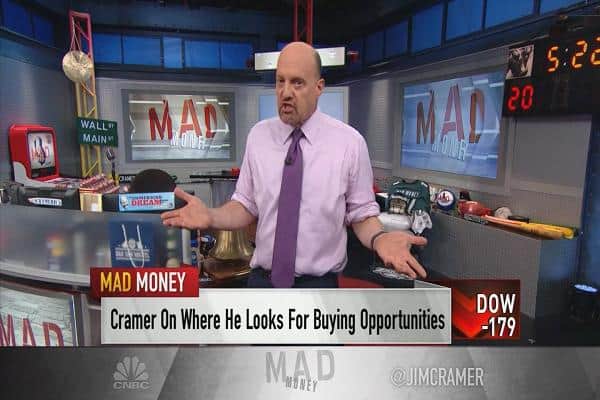
On tepid trading sessions that come after big market surges, CNBC’s Jim Cramer likes to search for under-performing stocks of companies that still have strong underlying businesses.
“Most people prefer to chase what’s hot in the hope that they can get in on the next big thing, not before it’s happened, but while it’s happening,” the “Mad Money” host said on Tuesday.
“But the problem with hot stocks is that you’re often late to the party,” he continued. “The better approach? Find cold stocks of once-hot companies that could ignite again — that way you could potentially enjoy the whole run. In other words, find broken stocks of intact companies.”
Cramer dubbed the recent action in shares of e-commerce giant Amazon “the quintessential example” of a once-downtrodden stock that bounced back to generate real returns.
In late March, President Donald Trump launched a Twitter attack on the online retailer, accusing the company of scamming the U.S. Postal Service and criticizing its tax treatment.
“Put aside the fact that, by all accounts, the post office is actually turning a profit from Amazon,” Cramer said. “Forget that the president may have attacked Amazon because its CEO, Jeff Bezos, owns the Washington Post, which has been highly critical of this administration.”
“Didn’t matter, the tsunami of tweets crushed the stock,” he said.
Cramer knew that shares of Amazon would be exceedingly difficult to buy after the five-tweet firestorm, which helped send the routine outperformer down some 200 basis points.
Still, had investors done their homework, they would have realized that the U.S. Postal Service was free to exit the contract with Amazon or to make a new deal, the “Mad Money” host said.
“I remember telling people when I was on vacation that they had to buy, buy, buy Amazon [and] that my charitable trust … was picking it up every time the president tweeted,” Cramer said. “Hardly anyone wanted to listen.”
But what happened next proved Cramer right: Amazon reported what he called “the single best quarter of the year,” boasting 43 percent revenue growth year over year and sending the stock up about 7 percent in after-hours trading.
“It was the perfect example of a broken stock, not a broken company,” Cramer said.
For current broken-stock opportunities, Cramer flagged the stock of Raytheon, a massive defense company that makes the F-35 Joint Strike Fighter jet.
Shares of Raytheon slumped on Tuesday after Credit Suisse issued a downgrade on the stock, arguing that the defense sector has gotten too expensive and is nearing its peak.
“I don’t know about whether [Credit Suisse is] right,” Cramer said. “Raytheon’s orders sure aren’t peaking. I think this analyst broke the stock himself, but he didn’t even dent the company, which has the hottest products in the entire universe of armaments. Wait a day, [then] buy some.”
All things considered, the “Mad Money” host simply didn’t want investors to dismiss sliding stocks of good companies simply because of short-lived declines — or chasing the cheap stocks of potentially broken companies like J.C. Penney.
“Remember, in Cramerica, we’re looking for the stocks of very good companies that might have made a misstep or gotten downgraded or simply mispriced because of emotional, panicked selling,” he said. “We don’t want the stocks of companies that are genuinely in peril. As long you know the difference between a broken stock and a broken company, I think you can do very well for yourself by searching for unjustly marked-down merchandise.”
